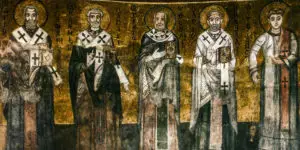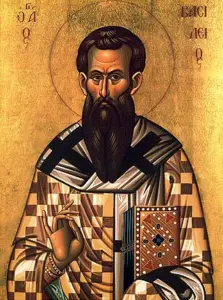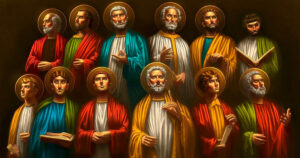The Bible is a Jewish book. Although we read it, study it and memorize it in English, it is not an American book. All but one of its forty or so authors was Jewish, and it was written from a decidedly Hebraic perspective. Therefore, in order for us to understand its meaning, we must read it in the way its authors and God intended it to be read. What were they trying to communicate to their original audience? How would they have understood it? These are the kinds of questions we should ask whenever we read Scripture, so that the integrity of the context, culture, and language is preserved. Greg Deuble, author and pastor, agrees. In his book, They Never Told Me This in Church, he writes:
It might sound like an over-simplification to say that the Bible is a Hebrew book and must be approached through “Hebrew eyes.” It was written within the culture and thought-forms of the Middle East. In order to understand its message we must become familiar with the thought-forms, idioms, the culture and customs of those who lived in Bible times.[1]
In Jesus Was A Jew, author Steve Ray also drives home the importance of understanding the Bible in its proper Hebraic context:
When we open the pages of our English Bible, we find a Jewish book! The setting revolves around Israel and the worship of Yahweh…The point is, how can we understand the Bible and the teaching surrounding our Lord Jesus and salvation without understanding his people, his culture, and his Jewish identity?[2]
Why it’s important to read the Bible as a Jewish book
Indeed, failing to read the Bible with a proper perspective creates a breeding ground that is ripe for misinterpretation and doctrinal error. As one Bible software executive observed:
It’s all too easy to read Scripture as if it was written yesterday. But when we read the Bible through a modern lens, we open ourselves up to major misinterpretation. If we want to understand the Bible, we need to see it through the eyes of someone from the culture in which it was written…. You can’t understand Christianity without a proper understanding of Judaism…[3]

Unfortunately, the Church Fathers proved this to be true. By interpreting the Bible through a Greek philosophical lens, they effectively began the process of severing Christianity from its Jewish roots. Professor and Old Testament scholar, Norman Snaith, explains:
The confusion appears as early as Clement of Alexandria and Origen, and it arose from the fact that these scholars were Hellenists first and Christians second. It was furthered by the fact that all men until Jerome, tended to read the Greek Bible as a Greek book, and with Hellenistic eyes… They interpreted the words as Greek words, just as if Greek had been the original tongue. Later this was done for centuries with the Latin Bible, and it has been the fate of the Bible in every language into which it has been translated. The result of this has been that from a very early stage, Christianity itself has tended to suffer from a translation out of the Prophets and into Plato.[4] (emphasis added)
For example, the prophets clearly portray the coming Messiah as a man who would be like Moses, from among the brethren.[5] He would be a descendant of David, appointed to rule on God’s behalf in the power and authority delegated to him.[6] In other words, he would be God’s shaliah or agent. The principle of agency, seen in both Old and New Testaments (i.e., Adam, Joseph, Moses, the twelve apostles, and others), is a familiar part of Hebraic culture. Professor and Biblical scholar, Marianne Meye Thompson, explains the principle:
In the rabbinic writings there is reference to the figure of the saliah [shaliah], which literally means “one who is sent”… A saliah was a surrogate sent on a task or a mission with specific instructions and authority to carry it out. According to the Talmud, a saliah could, among other things, carry out business transactions, make binding treaties and arrange marriages. A common saying in the rabbis was “the one who is sent is like the one who sent him” or “a man’s agent is equivalent to himself. Because the saliah may act on behalf of the one who sent him, when one deals with the saliah it is as if one is dealing with the one who sent that person.[7] (emphasis added)
But instead of seeing Jesus in light of his Biblical portrayal as God’s agent, the early Church Fathers viewed him through a Platonic lens which, over time, evolved into a belief that fundamentally transformed him from being the human agent of God into God himself. This transformational process from man to deity caused tremendous turmoil in the Church and necessitated the convening of numerous councils to deal with the contradictions their God-man theories created. Ironically, each ensuing council and the creeds they produced served to create more confusion.

By reading Scripture through a Greek lens, the Church Fathers dismantled the Hebraic framework upon which it was built. For example, at the Council of Constantinople (381 AD), Gregory of Nyssa is credited with merging competing ideas about the one God into a creed that declared Him to be three persons in one essence, something that was completely outside the realm of traditional Hebraic thought and therefore, first century Christianity. How did Gregory achieve such a feat? Professor and historian Harry Wolfson, provides us with the shocking answer:
It’s a solution by harmonization, an attempt to combine, as Gregory of Nyssa characterizes it, the monotheism of the Jews and the polytheism of the Greeks. The method of harmonization used by them was to thin down the Jewish monotheism as a concession to Greek philosophy.[8]
Later, at the Council of Chalcedon (451 AD), an even further departure from Scripture was achieved. Jesus was deemed to have two natures, one fully human, the other fully divine, and yet he mystically remained one being. This Jesus was different than the Jesus of the New Testament, as Professor Joseph Fitzmyer explains:
The New Testament gives no inkling of the teaching of Chalcedon. That council not only reformulated in other language the New Testament data about Jesus’ constitution, but also reconceptualized it in the light of current Greek philosophical thinking. And that reconceptualization and reformulation go well beyond the New Testament data.[9]
Orthodox or Unorthodox?
Regrettably, Bible readers today perpetuate the errors of the Church Fathers by failing to take into account the Jewishness of Scripture. What is more alarming, however, is the fact that these errors are committed, not just by lay people, but by commentators and translators as well. Dr. E.W. Bullinger, in his book, Figures of Speech Used in the Bible Explained and Illustrated, writes:
From non-attention to these Figures [of Hebraic speech], translators have made blunders as serious as they are foolish…..Commentators and interpreters, from inattention to the figures, have been led astray from the real meaning of many important passages of God’s Word; while ignorance of them has been the fruitful parent of error and false doctrine.[10]
While this is a very troubling observation, it may be only a symptom of a deeper problem: religious pride. We can be so certain of our own orthodoxy that we refuse to entertain the idea that we could possibly be wrong in our interpretation of Scripture. Indeed, we can be so entrenched in the “rightness” of our positions that we refuse to be like the noble-minded Bereans who, upon listening to the new unorthodox teaching from Paul, examined “the Scriptures daily to see whether these things were so.”[11] The great irony is that our own orthodoxy may very well be unorthodox. Reverend Philip Brooks notes the hazard associated with pride in one’s orthodoxy:
Orthodoxy is, in the Church, very much what prejudice is in the single mind. It is the premature conceit of certainty. It is the treatment of the imperfect as if it were the perfect.[12]
Undoubtedly, as author and theologian, J.I. Packer, reminds us, “Scripture, indeed, contains emphatic warnings against uncritical deference to traditions and speculations in theology.“[13] For example, the Pharisees and scribes took pride in what they viewed as the perfection of their traditions, that is, in what they considered to be orthodox. But Jesus said their traditions were actually invalidating the word of God.[14] Saul of Tarsus was so convinced in the orthodoxy of his day–that Jesus was not the Messiah–that he was willing to kill to preserve it. Even though Jesus prodded him with “goads” he refused to yield. [15] Thankfully, after an encounter with the Lord, Saul accepted that he had been wrong about his beliefs, and he was subsequently mightily used by God to spread the very truth he fought against.
The reality is that we all, lay person and scholar alike, come to the Bible with some measure of bias. Therefore, it is incumbent upon us to purposefully and prayerfully divest ourselves of any and all biases and preconceived ideas if we are to re-read Scripture with new eyes. J.I. Packer elucidates:
We do not start out our Christian lives by working out our faith for ourselves: it is mediated to us by Christian tradition, in the form of sermons, books and established patterns of church life and fellowship. We read our Bibles in the light of what we have learned from these sources; we approach Scripture with minds already formed by the mass of accepted opinions and viewpoints with which we have come into contact, in both the Church and the world...It is easy to be unaware that it has happened; it is hard even to begin to realize how profoundly tradition in this sense has molded us. But we are forbidden to become enslaved to human tradition either secular or Christian, whether it be ”catholic” tradition, or “critical” tradition or “ecumenical” tradition. We may never assume the complete rightness of our own established ways of thought and practice and excuse ourselves from the testing and reforming them by Scripture.[17] (emphasis added)

Some may be hesitant to reexamine their most fundamental beliefs, being concerned that reading the Bible through a Jewish lens will somehow weaken their faith. But authors Ann Spangler and Lois Tverberg, contend that doing so will deepen our faith. In their book, Sitting at the Feet of Rabbi Jesus, they write:
…instead of undermining our faith, looking at the Jewish background of the Bible deepens our understanding of Jesus and his times, increasing our awe as we look more closely at this extraordinary rabbi and his astonishing claims.[18]
Others may be fearful that re-reading the Bible from a Jewish perspective might expose their views as being unbiblical and result in a call to abandon a long held tradition or interpretation. But we should be more fearful of what might happen if we don’t re-examine our positions. A failure to do so may mean that we continue in a wrong belief and inadvertently perpetuate a false doctrine. If we are to worship God the Father in spirit and in truth,[19] we must choose to honor His word above all else. Such is the case of famed Bible translator, John Wycliffe, whose belief in the supremacy of Scripture was summarized by biographer Lewis Sergeant:
The gist of what [John Wycliffe] has to say on every point is practically this, that where the Church and the Bible do not agree, we must prefer the Bible… [20]
Without a doubt, Scripture can withstand scrutiny. The question is, can our doctrine? May we be a people who love truth more than we love tradition.
[1] Greg S. Deuble, They Never Told Me This in Church, (Atlanta, GA; Restoration Fellowship, 2006), p. 61
[2] Steve Ray, Jesus Was A Jew: Understanding Jesus and the New Testament, accessed 01-08-18 www.catholic-convert.com/documents/JesusAJew.doc
[3] Kaleb Cuevas, “Reading Scripture Through the Proper Lens,” Logos.com, July 21, 2015, accessed 04-29-19, https://blog.logos.com/2015/07/reading-scripture-through-the-proper-lens/
[4] Norman H. Snaith, The Distinctive Ideas of Old Testament, (London: Epworth Press, 1955) p. 161
[5] Deuteronomy 18:15, 18; Acts 3:22; 7:37.
[6] Acts 2:29-36; Micah 5:2; Jeremiah 30:21, Daniel 7:13-14; Matthew 28:18, etc.
[7] Marianne Meye Thompson, “Gospel of John,” in Dictionary of Jesus and the Gospels, Joel B. Green, ed. 1992 (Downers Grove, IL: Intervarsity Press, 1992), p. 377.
[8] Harry Austryn Wolfson, The Philosophy of the Church Fathers (Cambridge: Harvard University Press, 1970), pp. 578-579.
[9] Joseph Fitzmyer, A Christological Catechism, (Costa Mesa: Paulist Press, 1991), p. 102.
[10] E.W. Bullinger, in his book, Figures of Speech Used in the Bible Explained and Illustrated, (Grand Rapids, MI: Baker Book House, 1968), p. xvi
[12] Alexander V.G. Allen, Life and letters of Phillips Brooks, Vol. III, (New York: E. P. Dutton, 1901), p. 74.
[13] J.I. Packer, “Fundamentalism” and the Word of God,“ (Grand Rapids, MI; William B. Eerdmans Publishing, 1958), p. 69-70.
[14] Mark 7:1-13.
[15] Acts 26:12-18.
[17] J.I. Packer, “Fundamentalism” and the Word of God, (Grand Rapids, MI; William B. Eerdmans Publishing, 1958), p. 69-70.
[18] Ann Spangler and Lois Tverberg, Sitting At The Feet of Rabbi Jesus (How the Jewishness of Jesus Can Transform Your Faith) ( Grand Rapids, MI; Zondervan, 2009), p. 18.
[19] John 4:15-25.
[20] Lewis Sergeant, John Wyclif [sic], Last of the Schoolmen and First of the English Reformers, (New York: G.P. Putnam’s Sons, 1893), p. 325 fn




Thanks for stopping by the website and for taking the time to comment. I really appreciate your encouragement!
May we continue in a “love of the truth so as to be saved” (2 Thes. 2:10).
Blessings!
This is very interesting but it is nothing knew. That’s why there are more than 27,000 different Christians denominations in USA only. It means, more than 27,000 interpretations of the scriptures. Notice, I called them scriptures, not bible or new and old testaments. You can even hear some folks deciding who is save and who is not. The problem, and I fall into this category, we are using the scriptures to judge others rather than judging ourselves. “Lets start with the man in the mirror”.